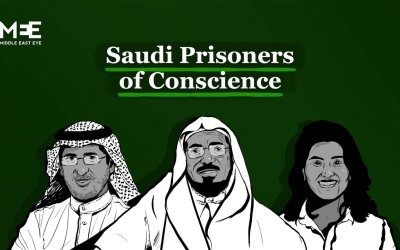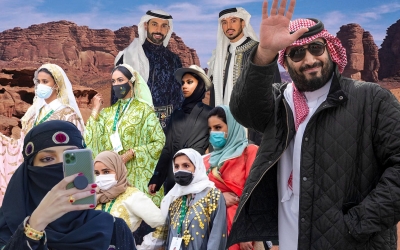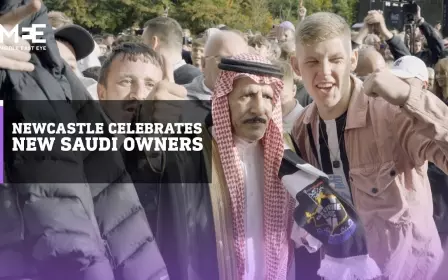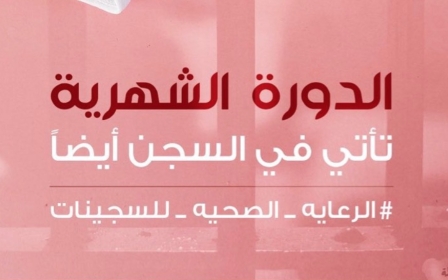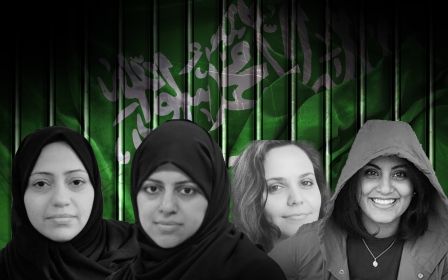Soundstorm: Why are DJs flocking to play in Saudi Arabia’s music festival?
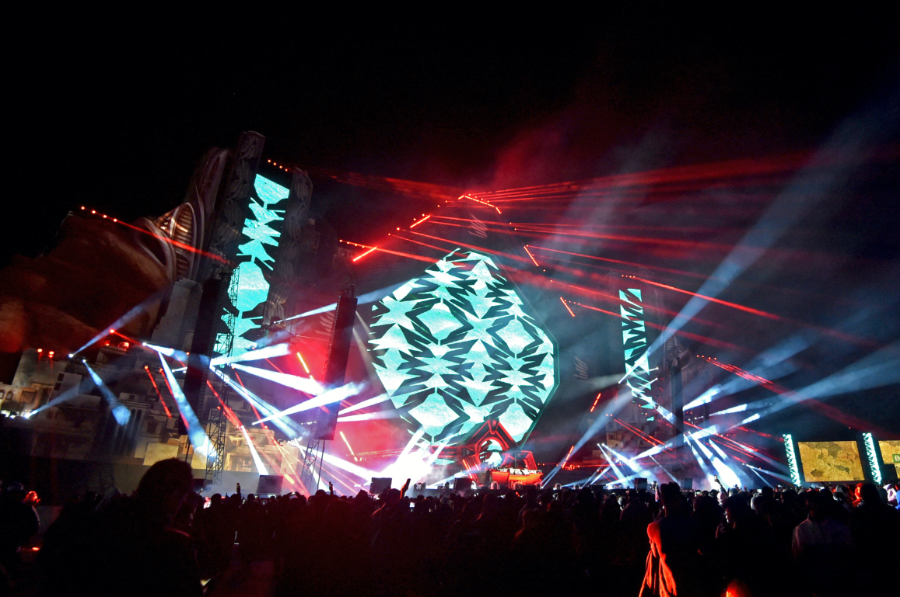
Between December 16 and 19, the airspace above Saudi Arabia’s Riyadh Airport will see an influx of private jets from London, Berlin and Los Angeles.
It will not be businesspeople or royal functionaries on those planes, but some of the more than 200 colourfully dressed DJs and musicians booked to play at Soundstorm, a four-day electronic music festival that human rights activists say is part of a campaign by Saudi authorities to whitewash its international reputation.
'It hurts that someone who came from underground music can accept money from a government responsible for some of the worst human rights abuses'
- Annabel Ross, journalist
“After brutal crackdowns on activists, women’s rights defenders and the murder of [Saudi journalist] Jamal Khashoggi, Saudi Arabia’s image has taken blow after blow,” Hashem Hashem, a regional campaigner for Amnesty International based in Beirut, tells Middle East Eye.
“They are trying to attract foreigners by appearing to be a progressive kingdom. We’ve also been seeing concerts, Formula 1, golf tournaments and other sports events.”
Promising lasers, speaker stacks, smoke machines and giant disco balls, Soundstorm will host scenes more familiar to crowds in the United States and Europe than Saudi Arabia. A four-day pass costs 399 Saudi riyal, or around $106.
New MEE newsletter: Jerusalem Dispatch
Sign up to get the latest insights and analysis on Israel-Palestine, alongside Turkey Unpacked and other MEE newsletters
The first event of its kind took place in 2019, when 400,000 people attended the dance music festival MDL Beast, according to official figures. Artists and influencers paid to promote the festival were heavily criticised.
This year, as in 2019, most of the performing artists are from what is widely referred to as the EDM scene, where multi-millionaire DJs like David Guetta and Tiesto play trance and high-tempo hip-hop remixes at mega-raves, particularly popular in the US.
But at least 30 DJs on the lineup are from electronic music’s so-called “underground,” a term loosely used to describe the more subtle, repetitive genres of house and techno heard in clubs and warehouse parties across Europe.
Viewed by its followers as a more tasteful, purist form of dance music, it’s suited to night-long partying and hypnotising clubbers. Along with these more subtle sounds comes, according to many of its fans, a commitment to social justice and human rights.
Unlike DJs from the EDM scene, many underground music fans expect certain principles from their favourite DJs. There are numerous instances of high-profile house and techno names being outcast over sexist or homophobic statements. Many top artists boycott Israel and publicly comment on global injustices.
House and techno have origins in the US’s Black and queer communities, which developed these styles at raves in Chicago, Detroit and New York in the ’80s and ’90s.
Decades later, the underground electronic scene is, for many, still a place for personal liberation and safe freedom of expression. Many of its most popular DJs are openly queer and the scene’s most famous venue, Berghain, is a gay club. Hundreds of artists, including some of those performing at Soundstorm, use social media to regularly champion issues like feminism, antiracism and LGBTQ+ rights.
In 2020, the Belgian techno DJ Charlotte de Witte, who will perform at Soundstorm, used Twitter to condemn violence against women in Turkey. The same year, Lee Burridge, another DJ booked at Soundstorm, asked his followers to show “solidarity and empathy to those who need it most” in a lengthy Facebook post. Nina Kraviz, another DJ performing, regularly speaks out on women’s rights.
There are many more examples like these. But, as the bookings at Soundstorm make clear, there is a gap between the values held by many in the scene and the actions of its top DJs.
“It hurts that someone who came from underground music can accept money from a government responsible for some of the worst human rights abuses in the world,” Annabel Ross, a music journalist who reports on sexism and abuse, tells MEE.
Puppets for the monarchy
At least one DJ playing at the festival has defended the decision, suggesting his set may play a role in bringing about change in the conservative kingdom. “Having such a large event and inviting DJs to play unrestricted might make some difference,” techno DJ Jeff Mills wrote in a since-deleted Facebook post.
Similarly, Stacey Piggott, a veteran Australian publicist, put a positive spin on international performers going to Saudi Arabia as a way to highlight human rights abuses in the kingdom.
“There will be millions of F1 fans who would have had no idea about the human rights issues in Saudi until this week. That awareness is a positive for activists,” she told MEE ahead of a panel discussion at Soundstorm about the local music industry.
But human rights activists say the DJs playing in Saudi Arabia are simply puppets for the monarchy.
'Women’s rights activists are raped in prisons, but no visitor will hear that from the government. And they think they will help Saudi society'
- Rana Ahmad, activist
“The message delivered through this event is whatever message the Saudi government wants delivered, not what the DJs want to show,” says Duaa Dhainy, a researcher at the European-Saudi Organisation for Human Rights, or ESOHR.
Research by ESOHR shows that Saudi Arabia has performed 64 executions in 2021, more than double last year. At least eight of those were for “high treason” or alleged political crimes, including Mustafa al-Darwish, who was executed at 26 for participating in anti-government protests when he was 17.
“The best way to deal with the human rights violations in Saudi Arabia is not to go,” says Dhainy. “This is what human rights groups ask.”
Rana Ahmad, a Saudi activist and author who fled to Germany, burst out laughing at the suggestion that DJs could be responsible for any kind of social change in the country.
“Mohammed bin Salman can pay a lot of money for anyone to play music or sport,” Ahmad tells MEE. “Women’s rights activists are raped in prisons, but no visitor will hear that from the government. And they think they will help Saudi society? It’s sad.”
In July, Human Rights Watch released a report highlighting the extent of the torture suffered by political prisoners in Saudi Arabia's prisons. The report offered further evidence that prisoners, such as women's rights activist Loujain al-Hathloul, were subjected to violent treatment including electric shocks, beatings, whippings, and sexual threats.
Hathloul was released in February after three years in prison but is still subject to a travel ban.
A rare code of silence
MEE has reached out to over 10 DJs playing at Soundstorm for comments, but all either declined to be interviewed or did not respond to requests. In normal circumstances, DJs or their representatives reply to promotional inquiries within a few hours, eager to promote their next gig or release.
DJs in the underground electronic music scene do not spend their days surrounded by minders and personal assistants. Anyone who’s been clubbing in Berlin or London for a few years could probably get a DJ’s phone number through friends of friends. This reflects their status not as household names, but as relatively niche performers, likely selected by Soundstorm concert programmers deeply familiar with underground music scenes in Europe and the US.
Saudi Arabia is known to offer high, tax-free salaries to workers who spend a year or two working on cultural projects in the kingdom.
Maurizio Schmitz, a booking agent affiliated with some of the DJs playing, declined to comment for this story. The same goes for Alex Jukes, whose press agency represents Charlotte de Witte. Phone enquiries to Temporary Secretary, the booking agency for Dixon and Move D, were also not returned.
Several Facebook posts from Jeff Mills responding to criticism have since been deleted.
Ahmad, the Saudi activist, was unsure if artists playing had been made to sign non-disclosure agreements, but said it was likely their contracts will prevent them from going anywhere in Riyadh without their official government minders.
“The visitors aren’t allowed contact with the regular people inside Saudi Arabia, only people from or working with the government,” she said.
Because no DJ agreed to answer questions, MEE could not verify this statement. Representatives from MDL Beast, Soundstream’s parent company, also did not respond to written requests for comment.
Cashing in
The lineup for Soundstorm, funded by Saudi Arabia’s General Entertainment Authority, would likely have cost several million dollars to assemble, a booking agent in Berlin familiar with the industry tells MEE, suggesting that the festival could pay performance fees of at least triple the usual rate.
'The voices of the real Saudis can’t be heard, because human rights defenders are in prison'
- Duaa Dhainy, ESOHR
He estimated that, at a European festival, DJs like Dixon, Nina Kraviz and Amelie Lens could receive €25,000 ($28,138) for a two-hour performance. Booking agents, he says, may have taken advantage of Saudi Arabia’s deep pockets to multiply the fees for their artists, and increase the value of the industry-standard 15 percent commission they take home for themselves.
Lesser known European DJs on the bill, such as Move D and Thomas Melchior, would sometimes perform in European clubs for less than €2,000 ($2,250). They likely see a gig in Saudi Arabia as a quick payday.
Superstars from other fields have turned down offers to appear in Saudi Arabia for far bigger amounts. Nicky Minaj pulled out of an estimated $1.5m contract after pressure from human rights groups. Model-turned-author Emily Ratajkowski declined a paid invitation to appear at MDL Beast in 2019. Resident Advisor, a popular online platform for electronic music news and event listings, donated all proceeds from a £30,000 ($33,762) ad campaign for MDL Beast in 2019 to the International Committee of the Red Cross.
“Participating in such a festival is delivering the voice and image the Saudi government wants, even if you think you’re delivering something else,” says Dhainy.
“You’re not being hosted by the Saudis, but the Saudi government. The voices of the real Saudis can’t be heard, because human rights defenders are in prison.”
This article is available in French on Middle East Eye French edition.
Middle East Eye delivers independent and unrivalled coverage and analysis of the Middle East, North Africa and beyond. To learn more about republishing this content and the associated fees, please fill out this form. More about MEE can be found here.


